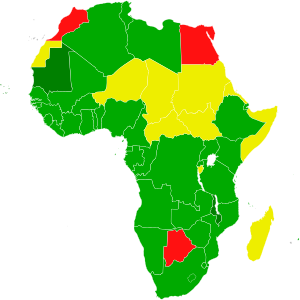
Back بروتوكول مابوتو Arabic মাপুতো সৌজন্যবিধি Bengali/Bangla Protocol de Maputo Catalan Maputo-Protokoll German Protocolo de Maputo Spanish Maputoko Protokoloa Basque Protocole de Maputo French פרוטוקול מפוטו HE Protokol Maputo ID Protocollo di Maputo Italian
| Protocol to the African Charter on Human and Peoples' Rights on the Rights of Women in Africa | ||
|---|---|---|

| ||
| Type | Human rights instrument (women) | |
| Drafted | March 1995 (Lome, Togo)[2] | |
| Signed | 11 July 2003 | |
| Location | Maputo, Mozambique | |
| Effective | 25 November 2005 | |
| Condition | Ratification by 15 nations of the African Union | |
| Signatories | 49 | |
| Parties | 44 | |
| Depositary | African Union Commission | |
| Languages | English, French | |
| Part of a series on |
| Violence against women |
|---|
| murder |
| Sexual assault and rape |
| Disfigurement |
| Other issues |
|
| International legal framework |
| Related topics |
The Protocol to the African Charter on Human and Peoples' Rights on the Rights of Women in Africa, better known as the Maputo Protocol, is an international human rights instrument established by the African Union that went into effect in 2005. It guarantees comprehensive rights to women including the right to take part in the political process, to social and political equality with men, improved autonomy in their reproductive health decisions, and an end to female genital mutilation.[3] It was adopted by the African Union in Maputo, Mozambique, in 2003 in the form of a protocol to the African Charter on Human and Peoples' Rights (adopted in 1981, enacted in 1986).
- ^ Spain (Canary Islands and Plazas de soberanía), France (Mayotte and Réunion), Portugal (Madeira) and the United Kingdom (Saint Helena).
- ^ Cite error: The named reference
PANAwas invoked but never defined (see the help page). - ^ The Maputo Protocol of the African Union Archived 15 April 2012 at the Wayback Machine, brochure produced by GTZ for the German Federal Ministry for Economic Cooperation and Development